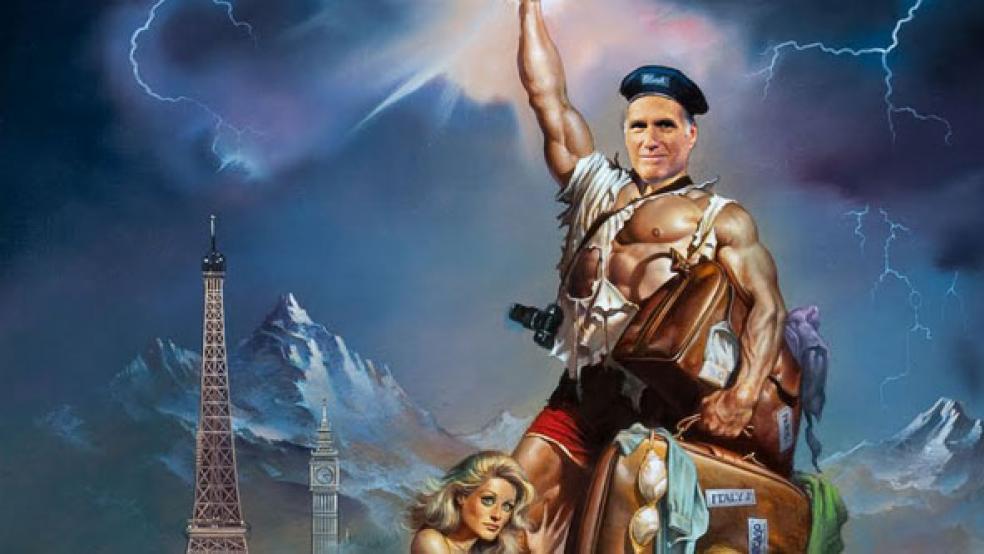Mitt Romney travels abroad this week to polish his presidential resume. But since Romney will avoid confronting head-on the vicious sovereign debt crisis in Europe that already appears to have engulfed the American economy, the trip may seem more like a vacation.

The presumptive Republican nominee plans to jet across the continent without setting foot inside the eurozone, the 17 countries bound together by a shared currency that are struggling to rescue the debt-ridden nations of Greece, Italy and Spain. Bailout packages for all three have done little to restore growth and calm jittery markets, which plunged again on Monday ahead of a visit by European officials to assess efforts by the Greek government to reduce its debt burden.
But Romney will largely steer clear of the debacle that has contributed to sluggish job growth for the past three months in the United States and a 3.72 percent drop in the Dow Jones Industrial Average since May.
Instead, his itinerary takes him to the United Kingdom and Poland, two countries that because of their currencies—the pound and the zloty—are somewhat removed from the crisis. For a presidential hopeful stumping on his business expertise, it is potentially a squandered opening.
“Candidates do this to show they’re ready for the presidential stage, but if you’re not talking about the number one issue, it begs the question of what you’re doing there,” said Jim Kessler, senior vice president for policy at the think tank Third Way.
The former Massachusetts governor has less ambitious priorities for his overseas sojourn. Romney departs after a Tuesday speech in Nevada for a six-day tour—which also includes a stop in Israel—that will be “an opportunity for the governor to lean and listen, to visit countries that share common values, common interests, and I should say in many cases shared heritage with people in the United States,” Lanhee Chen, the campaign’s policy director, told reporters in a conference call. His itinerary looks unlikely to duplicate the rock festival atmosphere of President Obama’s speech in Berlin during the 2008 campaign.
Romney, who ran the 2002 Winter Olympics, plans to attend the opening of the summer games in London in addition to meeting with British Prime Minister David Cameron. He will also host a pair of fundraisers in a city that has become a hornet’s nest for financial scandals—the AIG derivatives fiasco, the $5.8 billion JP Morgan trading loss, and a cartel of banks—four of which have executives co-chairing the Romney event—under investigation for rigging the Libor interest rate, according to The Washington Post.
In Poland, which the Paris-based Organization for Economic Cooperation and Development and Cooperation has described as its “best growth performer … through the global economic crisis,” Romney will talk with Nobel Peace Prize winner Lech Walesa, who led the country out of communism, and the current heads of its government. He is expected to emphasize national security issues and jab Obama for discarding plans to have a missile-defense system based in that country.
In some ways it’s wise for Romney to skip venturing deep into the crisis since he has little chance to influence economic policy in Europe. But those following the sovereign debt crisis wondered why he didn’t try to squeeze in a visit to Germany, the eurozone country with the resources to engineer bailouts for Greece, Italy and Spain.
Desmond Lachman, a research fellow at the American Enterprise Institute and former economist for the International Monetary Fund, noted that Romney would benefit from listening to German officials, since the crisis could come to a boil—with Greece possibly leaving the eurozone—as the November election approaches.
“You would think he would want to talk to the main players—the U.K. is on the outs,” Lachman said. “They’re not seen as part of Europe, whereas Germany is the driving force. If you’re going to lead the United States, you would think you would want to have some dealings with the main player in Europe—which is the Germans.”
But then, Romney has frequently demonized much of Europe as an example of the fate awaiting the United States if Obama secures another term.
“If I were not to get elected, we would in my view become more like Europe with higher deficits, with a debt that could put us in a Greece or Spain or Italy-like circumstance, with chronic high unemployment, with low wage growth and with a military that gets slowly but surely hollowed out so it could pay for the various programs that government would try to keep in place,” he told C-Span in an interview last month. And while the Obama administration has blamed the sputtering economy on the turmoil across the Atlantic Ocean, Romney insists there is little U.S. officials can do to fix Europe and that the underlying difficulties at home stem from the White House.
“If the president’s policies had worked, if he had been able to get America back on track, why we would be looking at what happened in Europe as being a problem, but certainly not devastating,” the candidate told CNBC last month. Those inside the Obama camp fired back that Europe would be an even graver threat if Romney succeeds in his pledge to roll back the financial regulations established two years ago by Dodd-Frank.
Austan Goolsbee, the former chairman of the White House Council of Economic Advisers quickly tweeted an imaginary dialogue between Romney and Dodd-Frank on June 17, “Romney: Repeal Dodd-frank! D-F: but w/o me it's back to what blew up the world-like Europe now Romney: so? D-F: oy.”




